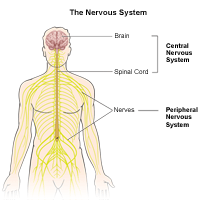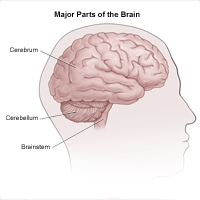Brain Tumor: Frequently Asked Questions
Brain Tumor: Frequently Asked Questions
Here are some frequently asked questions about brain tumors:
What is the brain, and how does it work?
The brain and spinal cord make up the central nervous system. The central nervous system controls everything we do. It controls the things we need to do, like talk, walk, and chew our food. It also does the things that need to be done for us, like control our breathing, heartbeat, and digestion. The brain sits in the bony skull. The spinal cord is surrounded by the vertebral column. These structures offer protection against the traumas of everyday life.
The brain is the center of these things and others:
How we feel, or emotion
How we think, or thought
How we remember, or memory
How we use our senses
It is made up of 3 main parts:
The cerebrum
The cerebellum
The brain stem
What is a brain tumor?
Brain tumors are tumors (abnormal growths of cells) that start in the brain. There are many types of tumors that can form in the brain. The type of brain tumor a person has depends on which cells have become abnormal. Brain tumors that happen in childhood are very different from those that happen in adulthood.
What are the different types of brain tumors?
Primary brain tumors are tumors that start first in the brain. They are classified by the type of brain cell that makes up the tumor. The most common primary brain tumors are called gliomas. These begin in the glial, or supportive, tissue of the brain. There are many types of gliomas.
There are other types of primary brain tumors that do not start in the glial tissue.
Secondary brain tumors are also known as metastatic brain tumors. These are cancer cells that started growing in another organ, like the lung, breast, skin, or kidney, and then spread to the brain.
What are the risk factors for brain tumors?
Risk factors are certain factors that increase the chance of a person getting cancer. In the case of brain tumors, there is no known strong risk factor. But some things may put people at higher risk:
Exposure to radiation, from nuclear accidents or from treatment for other tumors
Long-term exposure to certain chemicals, like vinyl chloride and petroleum products
Certain inherited genetic syndromes, like neurofibromatosis and Li-Fraumeni syndrome
Impairment of the immune system, as with AIDS. Most of the tumors linked to an immune system defect are primary central nervous system lymphomas.
Trauma is not considered a risk factor for brain tumors. Most people who get brain tumors do not have any known risk factors. And many people with known risk factors never get the disease.
What are the symptoms of a brain tumor?
These are the most common symptoms of a brain tumor:
Headaches. These can be worse in the morning and become less painful as the day goes on. About half of people with brain tumors complain of headaches.
Seizures, which are uncontrollable convulsions of the body
Nausea with or without vomiting. Vomiting is more typical in children.
Weakness or loss of feeling on 1 side of the body
Stumbling or inability to walk
Changes in vision or abnormal eye movements
Changes in personality, memory, and speech
Changes in alertness, from increased sleepiness to coma
Should everyone get a second opinion for brain tumor?
Many people with brain tumors get a second opinion from another healthcare provider. There are many reasons to get a second opinion:
If the person is not comfortable with the treatment decision
If the type of tumor is rare
If there are different ways to treat the tumor
If the first healthcare provider is not a brain tumor expert
If your health insurance requires it
How can I get a second opinion?
There are many ways to get a second opinion:
Ask a primary care healthcare provider. He or she may be able to suggest a specialist. This may be a neurosurgeon, neurologist, medical oncologist, or radiation oncologist. Sometimes these healthcare providers work together at cancer centers or hospitals. Never be afraid to ask for a second opinion.
Call the National Cancer Institute's Cancer Information Service. The number is 800-4-CANCER (800-422-6237). They have information about treatment facilities. These include cancer centers and other programs supported by the National Cancer Institute.
Seek other options. Check with a local medical society, a nearby hospital or medical school, or a support group to get names of healthcare providers who can give you a second opinion. Or ask other people who've had cancer for their recommendations.
How do healthcare providers treat a brain tumor?
Healthcare providers treat a brain tumor with these methods:
Surgery
Radiation therapy
Chemotherapy or other medicines
A combination of these treatments
What should I know about clinical trials for brain tumors?
Clinical trials are studies of new kinds of cancer treatments. Healthcare providers use clinical trials to learn how well new treatments work and what their side effects are. Promising treatments are ones that work better or have fewer side effects than the current treatments. People who participate in these studies may get to use treatments before the FDA approves them for the general public. People who join trials also help researchers learn more about cancer and help future cancer patients.
There are different types of clinical trials. Clinical trials investigate new medicines, test out new ways of administering chemotherapy/radiation, or compare standard treatments with newer ones. They can be Phase I, Phase II or Phase III, depending on how far along in development the new treatment is and what the study is investigating. There are many sites where you can explore clinical trials. There may be so many that they are confusing. When looking at a trial, first see whether it is for your type of tumor, then whether it is for a tumor that is newly diagnosed or one that has returned. You can also ask members of your healthcare team if they can help you find a clinical trial that might be right for you.
Updated:
March 21, 2017
Sources:
Clinical presentation and diagnosis of brain tumors. UpToDate
Reviewed By:
Alteri, Rick, MD,Cunningham, Louise, RN

